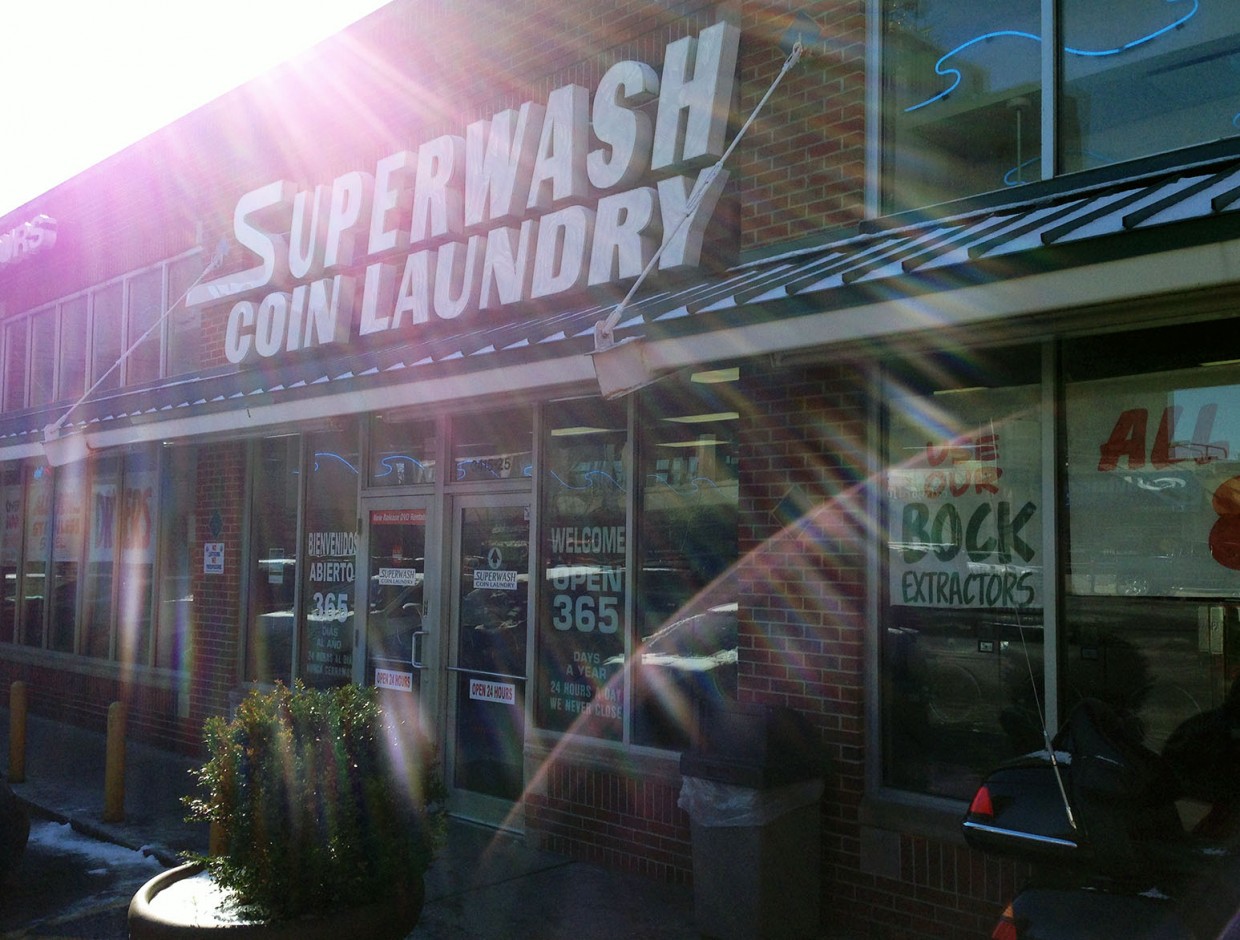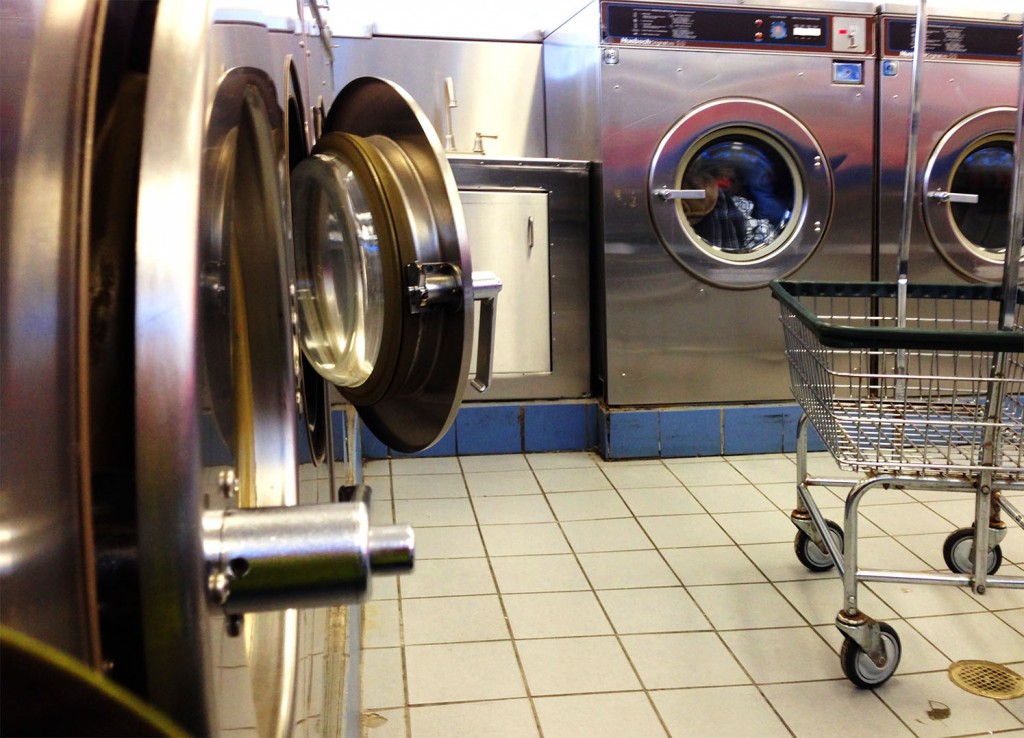Living: Airbnb in Avondale, Chicago
Working: Onsite at a client
Laundry: Superwash Coin Laundry
This week in laundry I listen to the poem of death, taxes, and laundry.
Benjamin Franklin, polymath of patriotic foundations, popularized the idiom death and taxes in a letter remarking upon the newly established American Constitution. The idiom originates from a comment upon the coincidental certainty of uncertainty and simultaneous inevitability of bureaucracy, that
…in this world nothing can be said to be certain, except death and taxes.
I agree, except to add that I believe in one more certainty beyond taxes, and that is laundry.
It’s true, you may argue, that there are those among us that forgo the act of laundry (whether that act was outsourced, or performed oneself). But I argue that those among us that forgo the participation in the ritual of laundry in one form or another, also likely forgo the obligation of taxes as well.
And if you’re reading this blog, it’s likely that you are not one of them.
So my friends together we may celebrate in the inevitable, the unavoidable, and the necessary. All characterized by their unique rituals. Each ritual with specific cultural importance and variance. But none the less each a collective social moment—the ritual of death, the ritual of taxes, and the ritual of laundry—calling us to participate, whether we want to or not.
Each of these events have ways of marking out lives. Often with different significance, and with each carrying a different load. The cadence of regularity also varies. But with each unavoidable event we find ourselves in different places, both physically (in terms of laundry for me, especially) but also emotionally. We catch ourselves at different ages, in different stages. Our relationships with the people and machines around us have changed, sometimes drastically. We’ve grown. We’ve regressed. We’ve transformed. Or maybe we’ve barely changed at all. But in each instance of the ritual, whether it be in death, taxes, or laundry, we find a moment to come together or be apart – we find a moment to reflect on our lives. Which is for each of us a journey unique to ourselves.
In the ritual of laundry, I find myself, once again, at a new public laundromat. I find myself in the company of strangers, working together towards the same goal (to do the wash), though each separately doing so to our own personal achievement. We are united in our divided commonality. And we support our mutual respect to do so. We are the people of the laundromat, and we mark our weekly progress in our lives by coming together to be alone in our necessary chore.
In the ritual of taxes, I find myself completed and prepared for the forthcoming April tax return deadline. Myself a member of the tribes of TurboTax and self-employed, I celebrate a certain ease of completion through the online tool, and a complexity in the strange realm of the self-employed. I have plans to form a corporation to work under, but did not do so last year. From this, I perform my unique tribal rituals, such as quarterly estimated payments, and self-employed tax levies.
I am prepared, and have executed my due diligence. Once again, for another year forward, I bear the designation of a tax paying American. I am happy to do so. This is a duty, and I perform it gracefully.
In the ritual of death, I find myself at an interesting crossroads. This past week, my grandmother passed away. This in itself is not that unusual – people die, and especially the elderly. As a family (my immediate family), we had lost touch with my grandmother (really my father’s stepmother) after my grandfather passed. Her cancer had returned, and it was her time.
What was unusual was how I found out about her death. Or how I half discovered it. Because it was through a social media post from my sister – a post expressing the magnanimity of strangers to reach out and provide comfort to a distraught soul – that I discovered that a grandmother had died. It wasn’t until my father called some ten hours later that I learned which grandmother had passed, and under what circumstances.
Now compound that experience with the following – when my father called, I did not express that through inadvertent social media I was already aware of the family death. But he knows now, through yet another online experience—this blog. (sorry Dad – I probably should have mentioned something at the time).
These two grief experiences in combination really beg the question – what is the nature of grief in the always online, social media age? How is the way in which we learn about the death of someone close affect our personal grief journeys? Does it make it better, or worse? Is the overall journey of grief better, or worse, with the help or detriment of the online realm?
I don’t have the answers, but one thing remains true regardless – grief is a process, and it is meant to be experienced with other people. The internet does not change this.
These experiences remind me of my most significant grief process to date. Specifically, they remind me of how I first learned of the death.
I became aware of my friends passing through what I thought was a casual instant message session with an acquaintance (not someone I would have considered close, and certainly not through an intimate personal conversation). It was through this (what I thought was) random exchanging of instant messages that I learned my close friend had killed herself. The exchange was so surreal that it wasn’t until I called my father to tell him the news (this friend was close to the family as well) that the weight of what had happened finally clicked in, and I cried for the first time.
Over a decade later, I’ve cried many times since.
I expect the weight of that experience will only ever be eclipsed by the death of my parents and siblings, which I do not expect to happen anytime soon. Though, per Mr. Franklin’s sentiments, I can’t know this for certain.
And like many of my friends who shared in the grief of this tragedy, I will likely carry the grieving forward with me for the rest of my life in some form or another.
Much like first loves have a way of lingering with us, first deaths do so as well. Both shape the people we become, though how they shape that person depends very much on how the person decides to let the experiences guide them.
Life gives us poetry, and it’s important to listen to the rhythm of its words—the cadence of its changes.
Life gives us poetry in the joy and pain it provides, through the intensity of the personal relationships that we form, and the mundanity of our routine obligations. Life gives us poetry in both love and grief, in both death and taxes, in the hate of our enemies, and the love of our families. And yes my friends, life gives us poetry in laundry.
In the rhythm of progress through timeliness of death, taxes, and laundry, this post produces a punctuation in that poem.
Because later this week, taxes are due.
Because earlier this week, one of my grandmothers passed away.
Because 11 years ago today, Angela died.
And because, just this minute, the dryer finished, delivering yet another week’s worth of clean, dry clothes.


